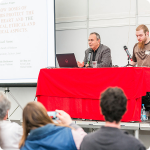Ultra-low doses of cannabinoids protect the brain, the heart and the liver: Medical, ethical and economical aspects.
Presentation of Yosef Sarne on Cannafest Prague 2013. The lecture is in the original version. Brief synopsis can be found in the description below.
We have previously shown that a single ultra-low dose of tetrahydrocannabinol (THC) protected the mice brain from a variety of insults including PTZ-induced seizures, CO-hypoxia, pentobarbital-deep anesthesia and MDMA-neurotoxicity. THC (0.002mg/kg, a dose that is 3-4 orders of magnitude lower than the doses that elicit the known acute effects of the drug), injected either 7 days before or 3 days after the insult, prevented the deteriorating effects of the insult as measured by a battery of cognitive assays 3-7 weeks following the insult. The same dose of THC induced long-lasting (7 weeks) biochemical effects in the brain, including the activation of ERK, CREB and BDNF (all are biochemical markers for neuroprotection and plasticity) in the hippocampus and frontal cortex.
A common feature of the various insults is the secondary activation of the innate immune system in the brain in response to the primary neuronal damage. We tested, therefore, whether THC is able to protect the brain from LPS-activation of the innate immune response. Intraperitoneal injection of the bacterial lipopolysaccharide (LPS) induced cognitive deficits that lasted for at least 7 weeks. A single injection of THC 0.002mg/kg either 48 hrs before, or 7 days after LPS prevented this long-term cognitive damage. The protective effect of THC was blocked by SR141716A, but not by SR144528, indicating the involvement of CB1 receptors. THC also attenuated the long-lasting (7 weeks) LPS-induction of cyclooxygenase-2 (COX-2) ,a marker for neuroinflammation, in the hippocampus and frontal cortex.
The innate immune system participates in, and contributes to, the development of damage in other organs as well. We therefore tested whether the same ultra-low dose of THC protected the mice heart from ischemic damage. Myocardial infarction (MI) was produced by coronary artery ligation and its morphological, functional and biochemical outcomes were studied 24 hrs later. MI produced a necrotic area (detected by TTC staining) that was infiltrated by neutrophils (observed by immunohistology), deteriorated functional shortening of the heart (as measured by echocardiography) and elevated the level of troponin T in the serum. All these parameters were significantly improved by THC (0.002mg/kg) injected either 2 or 48 hours before MI.
The ultra-low dose of THC was similarly effective in protecting the liver from ischemia-reperfusion (I/R) damage. A single injection of THC attenuated the necrotic area, suppressed caspase-3 activation, eliminated the expression of IL1a and TNFalpha in the hepatic tissue and reduced the level of liver enzymes in the serum.
The relevance of these findings to clinical conditions such as stroke, heart attack and liver transplantation, and the alternative use of various cannabinoid phamaceutical preparations, will be discussed.
Your are cordially invited to the annual conference at Cannafest, the international trade fair of cannabis and medical herbs that will take place on November 11-13, 2016 at the Prague Exhibition Holesovice. The conference presentations will be simultaneously interpreted into English and Czech.






